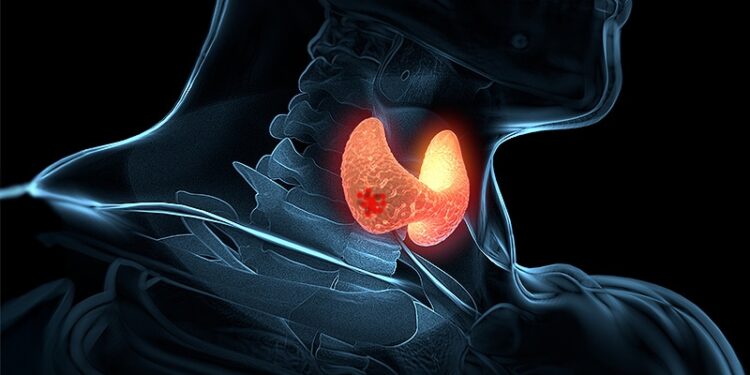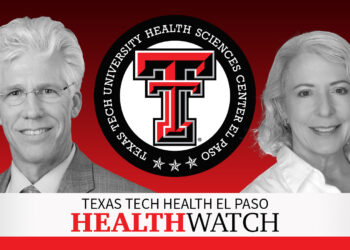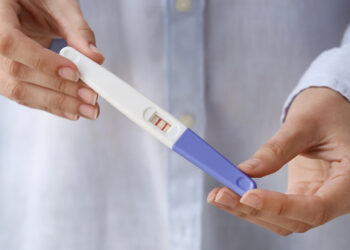TOPLINE:
A recent phase 3 trial found that 5-year recurrence-free survival was similar among patients who did and did not receive postoperative radioiodine, indicating the treatment can be safely avoided in patients with low-risk differentiated thyroid cancer — specifically those with pT1, pT2, and N0 or Nx tumors who have no adverse features after total thyroidectomy.
METHODOLOGY:
- Although now used less often, total thyroidectomy followed by radioiodine has traditionally been the standard of care for treating differentiated thyroid cancer. Observational studies and the ESTIMABL2 trial , published in 2022, suggested that patients with low-risk disease could safely skip radioiodine, but confirmatory evidence was still needed.
- The recent randomized, noninferiority, phase 3 IoN trial aimed to answer this question. The study involved patients at 33 cancer centers in the UK who underwent complete resection following total thyroidectomy and stage pT1, pT2, pT3, or pT3a disease.
- Researchers randomly assigned 504 patients (77% women) to receive (n = 253) or not receive (n = 251) postoperative radioiodine. Patients underwent neck ultrasound scans annually and serum thyroglobulin measurements every 6 months. The median follow-up was 6.7 years.
- The primary outcome was 5-year disease-free survival, defined as the absence of locoregional recurrent or residual structural disease, distant metastases, or death from thyroid cancer. Noninferiority was assessed with a margin of 5 percentage points.
- Overall, 47% of patients had pT1 tumors, 44% had pT2, and 9% had pT3 or pT3a; 91% of patients had N0 or Nx disease, and 9% had N1a disease.
TAKEAWAY:
- Overall, 17 recurrences were reported — 8 in the no-radioiodine group and 9 in the radioiodine group. The 5-year recurrence-free rate was 97.9% in the no-radioiodine group vs 96.3% in the radioiodine group, with an absolute risk difference of 0.5 percentage points (P for noninferiority = .033), highlighting the noninferiority of omitting radioiodine.
- Higher recurrence rates were observed in patients with pT3 or pT3a tumors than in those with pT1 or pT2 tumors (9% vs 3%) and in patients with N1a tumors than in those with N0 or Nx tumors (13% vs 2%). Additionally, baseline postsurgical thyroglobulin levels ≥ 2 ng/mL were associated with a higher risk for recurrence (hazard ratio, 12.75; P < .0001).
- Adverse events were comparable between the no-radioiodine and radioiodine groups, with fatigue (25% vs 28%), lethargy (14% in both), and dry mouth (10% vs 9%) being the most common.
- No treatment-related deaths or deaths from thyroid cancer were reported. But a total of eight patients died — an equal number in both groups. In the no-radioiodine group, deaths were due to two new primary cancers, one myocardial infarction, and one liver failure. In the radioiodine group, one death was due to bowel cancer and three due to vascular or unknown causes.
IN PRACTICE:
IoN and ESTIMABL2 together “offer strong and complementary evidence showing” that postoperative radioiodine can be avoided in patients with low-risk differentiated thyroid cancer — more specifically, pT1 or pT2 tumors with N0 nodal status and no other adverse features, the study authors concluded.
Although the evidence for or against radioiodine in patients with pT3, pT3a, or N1a tumors was deemed “insufficient,” the authors concluded that “most patients worldwide with low-risk differentiated thyroid cancer” can now safely avoid radioiodine.
SOURCE:
This study, led by Ujjal Mallick, Freeman Hospital, Newcastle upon Tyne, England, was published online in The Lancet.
LIMITATIONS:
Patients had relatively few recurrences, and the findings may not be applicable to the youngest patients. Additionally, molecular data (eg, on BRAF and TERT mutations) were not routinely collected from patients.
DISCLOSURES:
This study was funded by Cancer Research UK. One author reported receiving honoraria from Esai and the British Medical Ultrasound Society for presenting treatment options for differentiated thyroid cancer. Another author reported receiving honoraria from Esai for presenting treatment options for differentiated thyroid cancer. All other authors declared having no competing interests.
This article was created using several editorial tools, including AI, as part of the process. Human editors reviewed this content before publication.
Source link : https://www.medscape.com/viewarticle/safe-skip-postop-radioiodine-most-low-risk-thyroid-cancers-2025a1000j7z?src=rss
Author :
Publish date : 2025-07-21 10:09:00
Copyright for syndicated content belongs to the linked Source.











